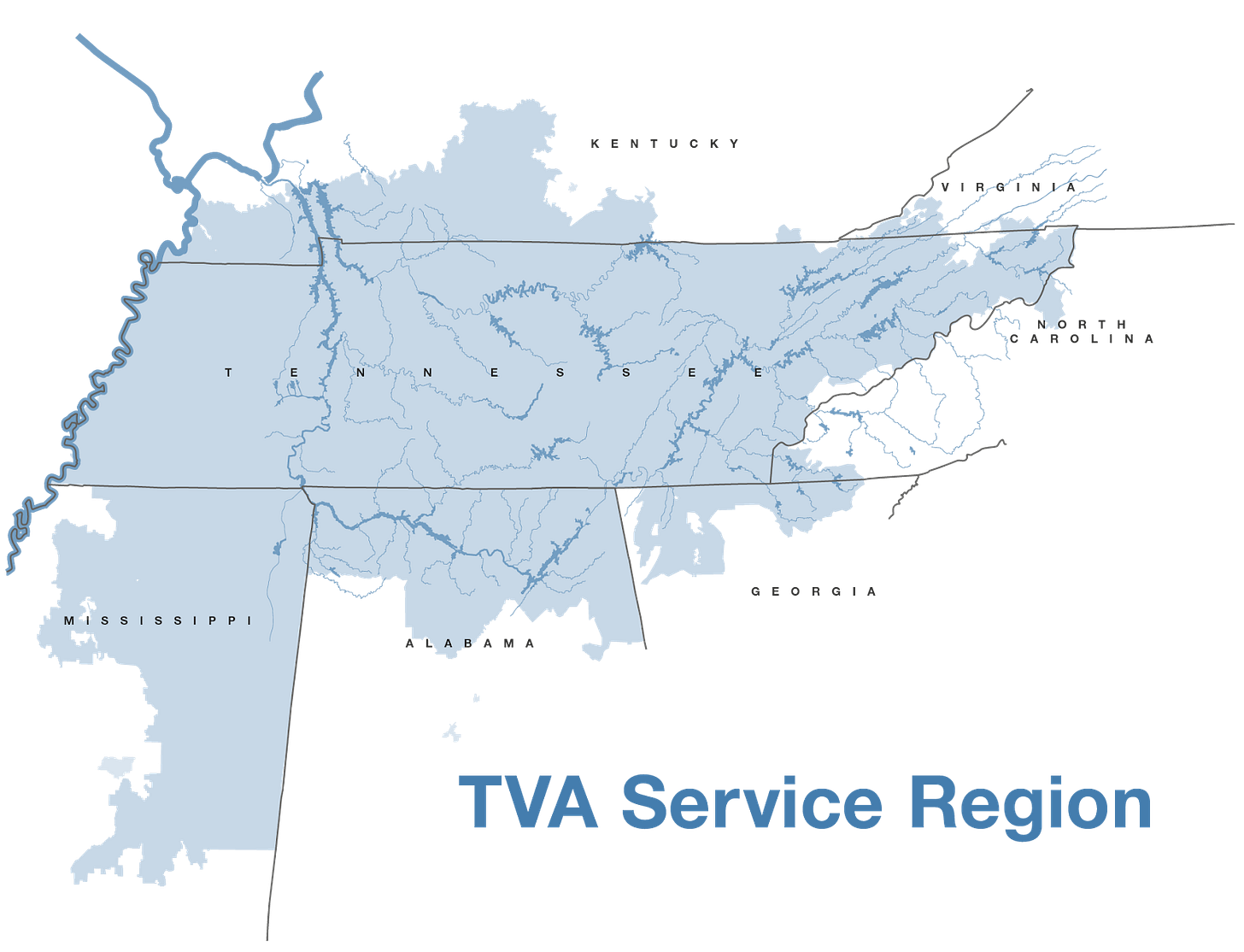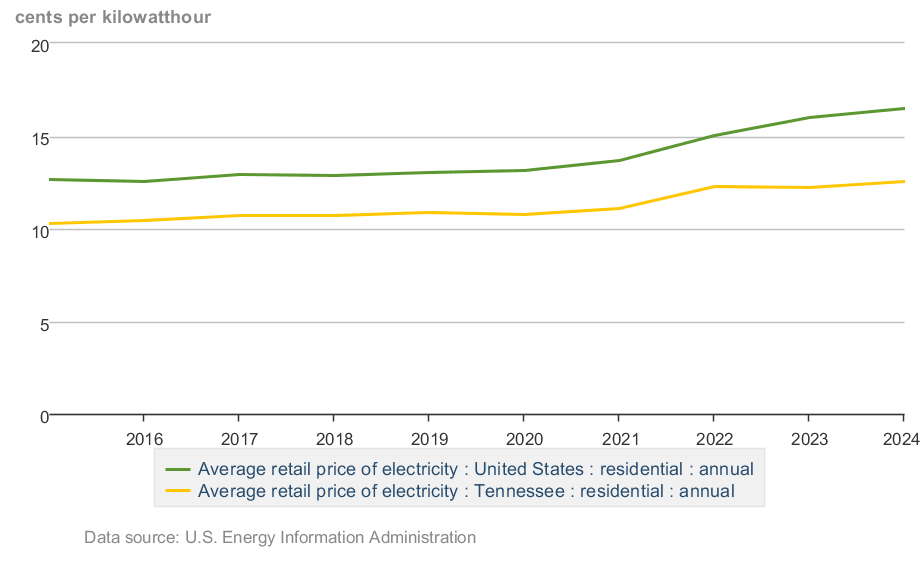TVA Board Shake-up: Privatization Push or Nuclear Power Play?
As privatization fears mount, some lawmakers say TVA’s future lies not in a sale, but in leading the next wave of U.S. nuclear development.
Since returning to office in January, President Trump has fired three members of the Tennessee Valley Authority (TVA) board. This move left the board without a quorum and increased pressure on the remaining members to fire CEO Don Moul. TVA, a federally owned utility serving 10 million people and employing more than 10,000 workers, plays a crucial role in powering the region. The sudden leadership shake-up has renewed speculation about whether this is the start of a broader push to privatize TVA.
While unions and other groups warn privatization could lead to job losses and higher rates, some lawmakers appear more focused on a different goal: a nuclear revival. Is TVA being prepared for the auction block or the launchpad?
How TVA Became a Powerhouse
The Tennessee Valley Authority Act, passed in 1933 under President Franklin Roosevelt’s New Deal, established TVA to improve infrastructure, electricity access, navigation and flood control in the Tennessee Valley. Unlike many federal programs, TVA receives no taxpayer funding and operates solely on revenue from power sales.

By the end of World War II, it had become the nation’s largest electricity supplier. In 1966, TVA began construction on its first nuclear power plant at Browns Ferry. Today, TVA customers pay rates lower than 70% of the country.
Talk of privatization is not new, nor is it tied to one political party. President Obama’s fiscal 2014 budget proposal called for a strategic review of TVA’s finances, including the option of selling assets. A 2018 proposal under President Trump suggested selling TVA’s transmission assets.
In both cases, the proposals met strong opposition from lawmakers, labor unions and local communities. The Obama-era review ultimately reaffirmed TVA’s value as a public utility, and the Trump proposal never gained legislative traction. Critics argued privatization would undermine TVA’s mission, disrupt affordable power for millions and erode transparency and accountability.
Inside the Boardroom Crisis
President Trump has removed three Biden-appointed TVA board members: Michelle Moore in March, Joe Ritch in April and Beth Geer in June. With only three of nine seats filled, the board lacks the five members required for a quorum. Without a quorum, the board cannot start new programs or change direction.
The changes extended further. According to a July article in The Atlantic, the Trump administration pressured the remaining board members to fire Moul. As of now, they have not done so.
The board cuts have raised questions about whether the motive is a push for privatization. Environmental groups warn the threat is real. In a joint press release opposing any sale, Daniel Tait of Energy Alabama said:
Turning TVA over to private, for-profit interests would mean higher electricity rates, destruction and loss of access to outdoor recreation areas, and other devastating consequences for families and businesses across the Tennessee Valley.
Labor unions are also raising alarms. Craig Martin, Southern Territory general vice president of the IAM Union, said in a press release, “Privatizing TVA would be a disaster for our members and for working people across the South.”
Some lawmakers are calling for increased accountability.
Any organization that pays their head $6 million a year plus bonus needs to be evaluated,
U.S. Rep. Tim Burchett said in an emailed statement to The Clarity Digest. He added, “For too long, the Tennessee Valley Authority has operated in the shadows.”
According to a 2021 report by Lazard, a global financial advisory firm, TVA’s CEO compensation is lower than that of most investor-owned utilities.
Still, for all the noise, the path to privatization is far from simple.
Privatization Talk: Real Threat or Political Theater?
Privatizing TVA would be a significant undertaking — and an unlikely one. Because TVA was created by an act of Congress in 1933, another act of Congress would be required to authorize any sale or restructuring.
That’s part of why past proposals, including those under both President Obama and President Trump, never gained traction. Opposition from lawmakers on both sides of the aisle, along with resistance from unions, local governments and ratepayer groups, has repeatedly stalled any real progress toward privatization.
Speaking at an Aug. 1 meeting of the East Tennessee Economic Council (ETEC) in Oak Ridge, U.S. Rep. Chuck Fleischmann, chair of the House Appropriations Subcommittee on Energy and Water Development, dismissed the idea:
It was not only Ronald Reagan. President Obama would put it in his budget every year to privatize the TVA. It’s a gimmick, okay, but it’s a bad joke… I’m going to say this. You have no worries. TVA will not be privatized. That talk is pretty much off the table.
This view aligns with Sen. Marsha Blackburn’s emailed statement:
Tennessee and the Tennessee Valley Authority should lead our nation in energy innovation.
Follow the Energy: The Nuclear Agenda
While some fear privatization, others argue the real story is nuclear. TVA is uniquely positioned to lead a national resurgence in nuclear power, and several lawmakers are eager to see it take the lead.
In December 2019, the Nuclear Regulatory Commission approved TVA’s early site permit for the Clinch River Nuclear Site in Oak Ridge. It was the nation’s first and only approval for small modular reactors (SMRs).

SMRs are smaller, factory-built nuclear reactors that generate up to a third the output of traditional reactors. They can be mass-produced and shipped to sites, reducing construction time and cost. Their smaller size allows them to operate in locations where large reactors cannot, such as remote communities or industrial facilities.
Sens. Marsha Blackburn and Bill Hagerty are vocal advocates for TVA’s role in nuclear expansion. In a March op-ed for Power Magazine, they wrote:
TVA could be to the nuclear race what NASA was to the space race.
In her statement to The Clarity Digest, Blackburn added: “We are going to ensure the United States leads the world in next-generation nuclear and the global race for energy dominance.”
What’s at Stake for Tennesseans
Despite the headlines and speculation, Tennesseans can rest easy for now. Electricity rates in the region remain among the lowest in the nation.
Independent assessments, including the Lazard report, indicate TVA is financially healthy and exceeding its targets. Past privatization reviews have concluded selling TVA would likely lead to higher rates and few benefits.
The real change isn’t privatization, but TVA’s growing role in a nuclear renaissance — positioning itself as the launchpad for America’s next era of clean energy.
At the ETEC meeting, Fleischmann emphasized how central TVA is to that vision:
There is no way I am going to get there on my nuclear renaissance for this country… unless I have a TVA… We need to be first in the nation.
For now, TVA’s future may depend less on privatization and more on how it embraces the nuclear path ahead.


